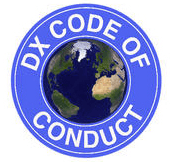![]()
HAM-RADIO

What is it and the
purpose:
Ham radio, also known as amateur radio, is a hobby and
service that involves the use of radio equipment to
communicate with other radio enthusiasts around the
world. This is NOT CB! Ham radio operators first needs to
be qualified with an exam about technical
radio/electronical related questions and their
communication laws respectively. Only when they succeed,
and only then can they use designated radio frequencies
to communicate via voice, Morse code, digital modes, and
other techniques. They also assist in emergency
communications during natural disasters and other
emergencies. Ham radio enthusiasts enjoy the technical
aspects of radio equipment design, experimenting with
radio propagation, and building and operating radio
communication stations.
The essence and purpose of HAM radio can be further
elaborated as follows:
1. Exploration and Experimentation: HAM radio provides a
platform for individuals to explore and experiment with
different aspects of wireless communication technology.
It allows enthusiasts to design, build, and modify their
own radio equipment, antennas, and systems, fostering a
deeper understanding of radio technology and its
applications.
2. Communication and Connectivity: HAM radio enables
operators to communicate with fellow HAMs locally,
nationally, and globally. It offers a means of
establishing connections and building friendships with
people from diverse backgrounds, cultures, and countries.
HAM radio operators often engage in
"ragchewing" - casual conversations about
various topics, creating a sense of community and
camaraderie among operators.
3. Public Service and Emergency Communications: HAM radio
plays a vital role in public service during emergencies
and disasters when traditional communication
infrastructures may be disrupted. HAM operators provide
essential communication links for emergency services,
relief organizations, and affected communities. They
assist in relaying critical information, coordinating
rescue efforts, and supporting communication between
different response teams.
4. Skill Development and Personal Growth: Engaging in HAM
radio activities allows individuals to develop a range of
technical skills, such as radio operation, antenna
design, electronics, and propagation principles. It
provides opportunities for self-improvement and learning,
fostering personal growth, and expanding knowledge in
fields such as electronics, radio engineering, and
emergency communication procedures.
5. Cultural Exchange and International Cooperation: HAM
radio transcends borders, language barriers, and
political differences. It promotes cultural exchange and
international cooperation by connecting operators
worldwide through the shared interest in radio
communication. HAM operators often participate in
international contests, events, and exchange programs,
promoting goodwill and fostering understanding among
people of different nations.
In summary, the essence and purpose of HAM radio
revolve around personal exploration, technical
experimentation, communication, public service during
emergencies, skill development, personal growth, and
fostering connections among radio enthusiasts worldwide.
It represents a unique intersection of technology,
community service, and international friendship.
Signed,
Guy ON6MU
www.qsl.net/on6mu
The DX code of conduct

This station supports the DX Code of Conduct:
I will listen, and listen, and then listen again before calling.
I will only call if I can copy the DX station properly.
I will not trust the DX cluster and will be sure of the DX station's call sign before calling.
I will not interfere with the DX station nor anyone calling and will never tune up on the DX frequency or in the QSX slot.
I'll wait for the DX station to end a contact before I call.
I will always send my full call sign.
I will call and then listen for a reasonable interval, and not call continuously.
I will not transmit when the DX operator calls another call sign, not mine.
I will not transmit when the DX operator queries a call sign not like mine.
I will not transmit when the DX station requests geographic areas other than mine.
I will not repeat my call sign, when the DX operator calls me, unless I think he has copied it incorrectly.
I will be thankful if and when I do make a contact.
I will respect my fellow hams and conduct myself so as to earn their respect.